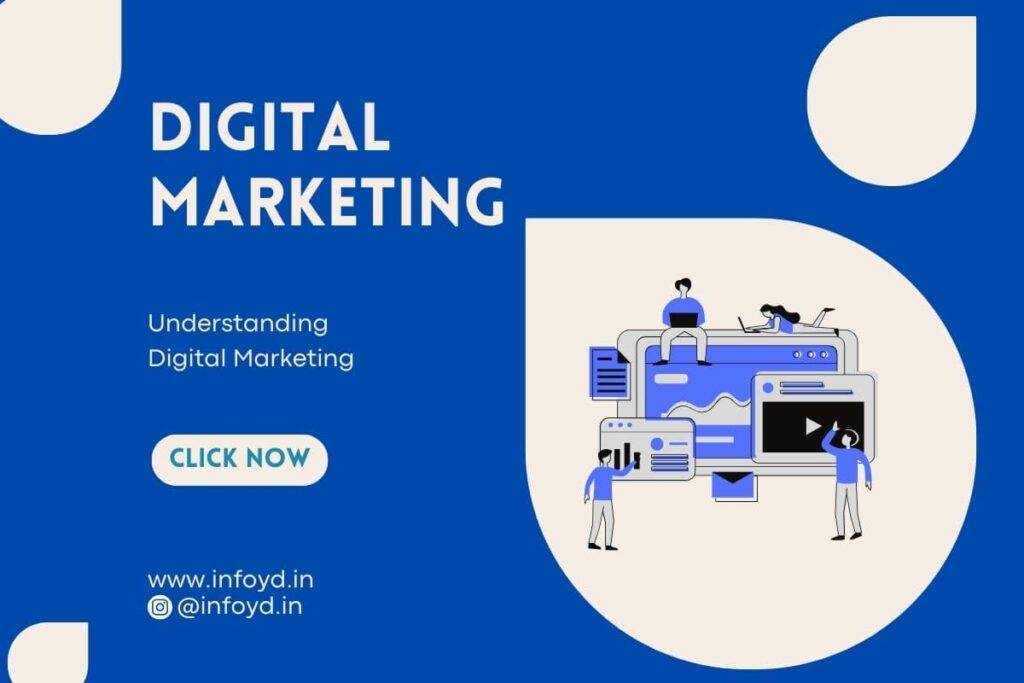What is Digital Marketing? Understanding Digital Marketing
Digital marketing refers to the use of digital channels, such as the internet, social media, search engines, email, and mobile devices, to promote products or services and reach a target audience. It encompasses various strategies and tactics that leverage digital technologies to connect businesses with their customers and achieve marketing goals. Here is a detailed overview of digital marketing: Website Optimization: A well-designed and user-friendly website is the foundation of any digital marketing strategy. It should be optimized for search engines (SEO) to improve visibility in search results, have clear navigation, relevant content, and compelling calls-to-action. Search Engine Optimization (SEO): SEO involves optimizing your website and content to rank higher in organic search engine results. It includes keyword research, on-page optimization (meta tags, headings, URL structure), technical optimization, link building, and creating high-quality, relevant content. Search Engine Marketing (SEM): SEM involves paid advertising on search engines, commonly known as Pay-Per-Click (PPC) advertising. Advertisers bid on keywords, and their ads appear at the top or bottom of search engine result pages. The most popular platform for SEM is Google Ads. Content Marketing: Content marketing focuses on creating and distributing valuable and relevant content to attract and engage the target audience. It includes blog posts, articles, videos, infographics, e-books, and social media content. The goal is to build brand awareness, establish authority, and drive customer action. Social Media Marketing: Social media platforms like Facebook, Instagram, Twitter, LinkedIn, and YouTube offer opportunities for businesses to engage with their audience, build brand awareness, and promote products or services. Social media marketing involves creating and sharing content, running ads, and engaging with users. Email Marketing: Email marketing involves sending targeted emails to a subscriber list to nurture leads, build customer relationships, and drive conversions. It can include newsletters, promotional offers, event invitations, and personalized content. Email marketing tools help automate and track email campaigns. Influencer Marketing: Influencer marketing leverages the popularity and credibility of social media influencers to promote products or services. Businesses collaborate with influencers relevant to their niche to reach their followers and gain credibility through endorsements or sponsored content. Affiliate Marketing: Affiliate marketing is a performance-based marketing model where businesses reward affiliates for driving traffic or sales to their website. Affiliates promote products or services through unique referral links, and they earn a commission for each successful referral. Mobile Marketing: With the widespread use of smartphones, mobile marketing focuses on reaching the audience on their mobile devices through SMS marketing, mobile apps, mobile-friendly websites, and location-based advertising. Analytics and Tracking: Digital marketing relies on data analysis to measure campaign performance, identify trends, and make data-driven decisions. Tools like Google Analytics provide insights into website traffic, user behavior, conversion rates, and ROI. Digital marketing offers businesses a wide range of channels and strategies to connect with their target audience, increase brand visibility, drive website traffic, generate leads, and ultimately boost sales. It provides measurable results and the flexibility to adapt and optimize campaigns for better performance.
What is Digital Marketing? Understanding Digital Marketing Read More »

